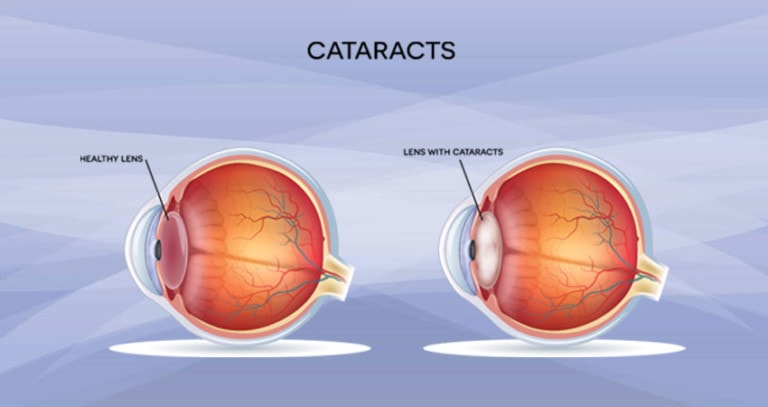A cataract is a clouding of the eye’s lens which often results in blurry or hazy vision. The lens is a crucial component of the eye, and it bends the light rays that enter the eye in order to help you focus your vision. The lens needs to be clear in order to do its job effectively, which is why cataracts can significantly impair your vision.
If you’ve ever struggled to see through a fogged-up car windshield, then you have some idea of what it’s like to try and see with advanced cataracts. They are among the most common eye conditions, especially among older adults. Researchers estimate that approximately 90% of people over the age of 65 have a cataract. Although age-related cataracts are the most common form, there are other types as well, including congenital and traumatic.
What symptoms might you experience with cataracts?
When cataracts are first formed they may produce symptoms that are extremely mild. If left untreated, however, they will develop over time and the associated symptoms will usually increase in severity. Some of the symptoms you may experience include:
- Blurred vision
- Fading colors
- Double vision in one eye
- Increased difficulty with night vision
- Glare from bright lights
You may also find that you frequently need to alter your eyeglass prescription, although it’s important to note that the effects of cataracts cannot be alleviated by corrective lenses. Cataract symptoms usually progress painlessly, which is partly why they often go unnoticed for long periods of time. If cataracts grow dense enough, they may result in complete vision loss.
How are cataracts most commonly treated?
The only way to remove a cataract is by undergoing cataract surgery. Cataract surgery is a very common and safe outpatient procedure that is performed by an ophthalmologist. Generally, cataract surgery is only recommended for patients have had their quality of life negatively impacted by the effects of a cataract. Many patients who are living with cataracts have no need for surgery.
Patients who do undergo surgery remain awake during the procedure while the surgeon removes the lens through a tiny incision. A new, clear lens is then implanted in the eye. Cataract surgery does carry some risks, notably of a detected retina, vision loss, or a dislocated lens.
What should I do if I think I have a cataract?
Obtaining a diagnosis through a cataract exam is the first step is you are experiencing any symptoms. If your ophthalmologist determines you have a cataract, they will ask you some questions to help decide if you are a candidate for surgery.The quicker you have your cataract examined, the less likely it is that you will experience severe symptoms.
The eye-health experts at Florida Eye Specialists are here to help you, so schedule a consultation today. Our world-class cataract center has helped tens of thousands of patients in Florida receive cutting-edge cataract treatment, and we are ready to do the same for you.

